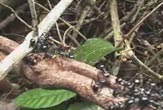Ants Forage Haphazardly

Ants don't march in predictable patterns to search for crumbs, as you might have thought by watching them. Instead, new research suggests they roam randomly.
This is not a matter of ant versus human intelligence, because a seemingly blind search can still make sense in both practical and mathematical terms.
"The beauty of a mathematical random walk is that it eventually visits all points in space if you walk long enough — and it always returns to its starting point," said William Baxter, an experimental physicist at Penn State Erie, The Behrend College.
Of course, Baxter notes, you might have to walk a long time to get back to the start. But a person who tries a search pattern, such as sweeping back and forth, can run into more trouble with unexpected obstacles.
Baxter's research stands out from others' by using a controlled environment and a single ant, as opposed to studying foraging ants in the wild. Tracking single ants allowed him to see how a single ant decides to search an area that is free of food, chemical clues or obstacles.
Each small ant walked down a string from its colony to the study area, where the ants normally expect to find an area with food. However, Baxter and his colleagues removed the food while conducting the experiment.
The ant search patterns often crisscrossed previous paths, but none of the ants ever intentionally retraced their steps. A few backed up for a few millimeters on occasion, but only rarely.
Get the world’s most fascinating discoveries delivered straight to your inbox.
A next step could involve repeating the experiment with pairs of ants to see if a foraging partner changes the search pattern.
"Will the mathematical model change? I have no idea," Baxter told LiveScience. "But biologists have known for years that groups of ants can accomplish tasks that single ants cannot."
Ants are known to communicate chemically and leave trails for others, which points to their cooperative intelligence and socially sophisticated ant societies. So for finding crumbs, two pair of antennae may turn out better than one – or the ant pairs might wander just as randomly as before.
The research was presented at the March meeting of the American Physical Society in Pittsburgh.
- Why Ants Rule the World
- What is it Like to Be an Ant?
- Images: Ants of the World
 Live Science Plus
Live Science Plus






